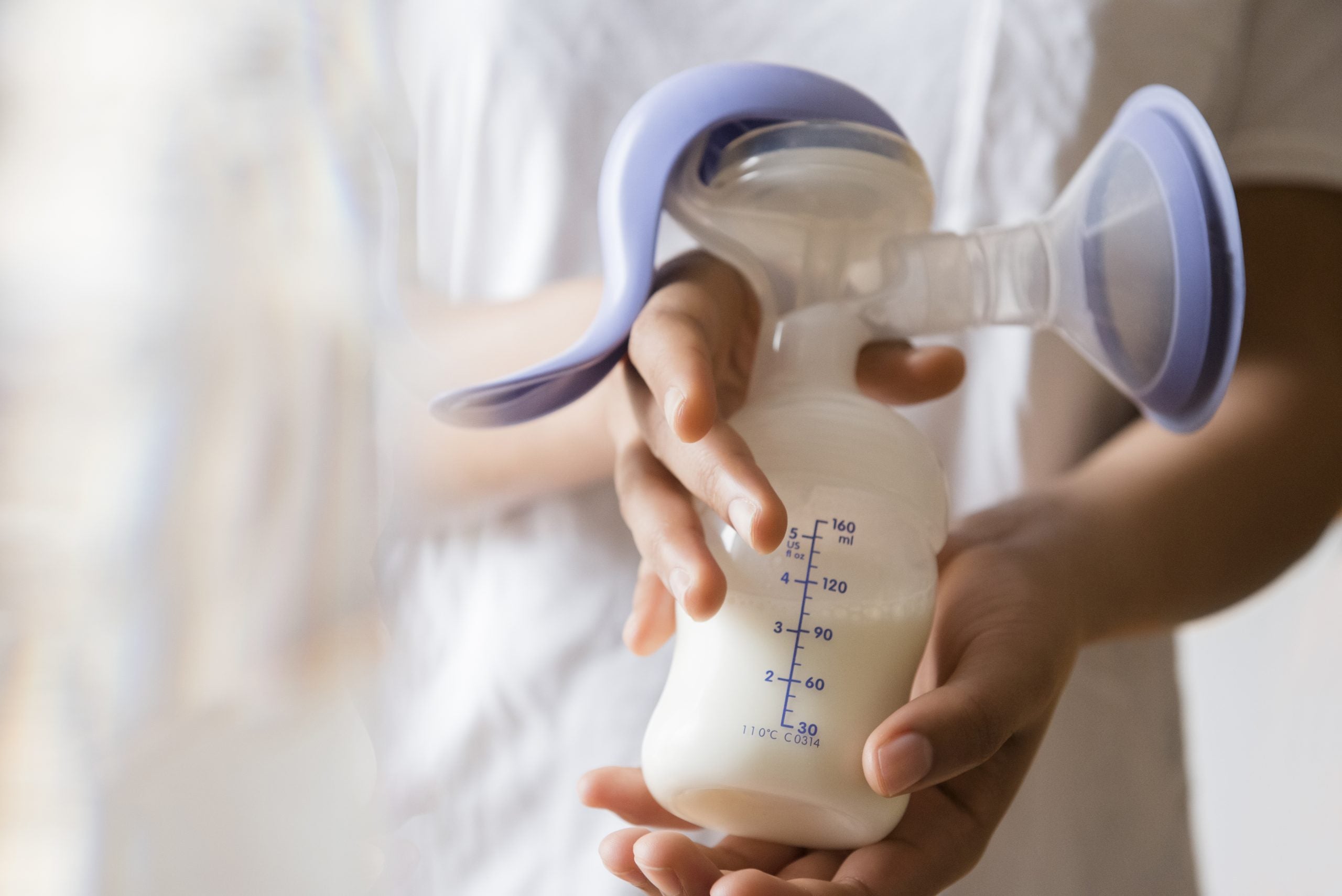
I didn’t grow up in a family of breastfeeding women. Formula was all I knew, but my professional work in maternal child health influenced my decision to breastfeed with my first child.
When my son arrived, we were prepared in every way. Everything leading up to and during the delivery went as planned. I anxiously took him to breast, and I was devastated when he couldn’t latch to my flat nipples, which were a result of a breast reduction I’d undergone 12 years prior. Hours later, I gave him formula as I tried to work past our issues and determine if the problem was my post-surgery breasts or his latch. Lactation specialists tried to help, but after many attempts, and what I now know in hindsight to be not trying enough, my breastfeeding journey came to an end shortly after I made it home where there was no peer-to-peer support.
It took months to release the guilt of not breastfeeding my son, but the saving grace was knowing that I would try again as our family grew. I would be THAT breastfeeding mama, and proudly in public, might I add.
Despite my plans, just two years later, I found myself recovering from a c-section while my daughter, born at 28 weeks, was being cared for in the Neonatal Intensive Care Unit (NICU). We were completely unprepared. In what seemed like the blink of an eye, I was staring at a hospital grade breast pump, taking urgent calls from neonatologists, getting my vital signs checked regularly, maneuvering concerned unannounced visitors, battling crying episodes, and looking at pictures of my newborn daughter connected to wires on my husband’s phone. She could not come to my room. I could not take her to breast.
Twelve hours would pass before I felt physically capable of making the trip to visit her in the NICU. There was nothing natural about this separation. I wanted my baby. My body needed her as much as she needed me.
Despite all of this, she needed breastmilk and she needed it now. Research shows that human milk can be life-saving for premature babies. I was a Black woman who had given birth preterm, and my daughter was at risk for infant mortality. All my maternal health experience would allow me to think about was that she had to make it through her first year.
When my husband wheeled me to the NICU, I was empty handed. No colostrum, no breastmilk, just lots of abdominal pain. The lactation specialist, who remained by my side, informed me of the NICU’s donor breast milk bank, reserved for babies born very preterm. I wasn’t familiar with donor milk, but I was willing to try it to make sure my daughter had the short and long-term benefits associated with breast milk.
Five days would go by, and each day the neonatologists would gently ask me if my milk had arrived. Painfully, each day the answer was no. On what would be my fifth and final day in the hospital, I held my daughter for the first time and celebrated the arrival of my first few drops! It was a dream come true!
Unable to take her to breast because she was too premature to suck, swallow and breathe, I held her skin-to-skin once a day, and exclusively pumped between trips to the hospital and being at home with my toddler at night. To stimulate milk production, hospital staff recommended I take videos of her crying and watch it while I pumped. I also found myself taking her dirty onesies home to sniff while I pumped at night to encourage my hormones to do their job.
My best pumping session would express 1.25 ounces from each breast. I always thought it would get better when I could enjoy the comforts of home with my baby, but as we transitioned, and as anxiety and post-traumatic stress disorder (PTSD) presented, within a month of returning to work, my supply started to deplete. I tried every safe mechanism I could find to increase my milk supply. I even tried re-lactating. Eventually, I had to abandon my breastfeeding journey. I was devastated, and it took nearly two years to release the feelings of guilt and disappointment.
I am grateful that I was able to provide my daughter with my breastmilk the first three months of her life and it was supplemented with the gracious donations from moms I will never know.
Today, my daughter is a thriving, healthy two-year-old. I credit my breast milk and the donations we received from the milk bank for her wellness. Even with the best efforts, it can be hard for some NICU moms to meet their baby’s needs. Liquid gold is beneficial even if only a drop. Keep going if you can.
Why do I share this deeply personal story? It’s not to scare you. It’s not to say that this will be you. It’s to share what I learned and what I think you should know about some NICU moms’ breastfeeding journeys and what resources are available to help provide human milk to premature babies.

WHAT I LEARNED
My experience with low supply is not unique to me.
Even removing the challenges that breastfeeding after a reduction can present, it’s often hard for mothers of premature babies to produce enough milk as our bodies are not prepared for birth and the stress of being in the NICU can make it hard to produce milk. There are numerous scholarly articles on the association between stress and milk production, especially as it relates to its impact on Black women. Additionally, certain medications and metabolic disorders, such as hypothyroidism and insulin resistance, can also negatively impact your supply.
Overcoming mother child separation takes work.
Returning to work too soon poses challenges, and without demand, your milk supply will disappear. For babies too premature to go to breast, exclusive pumping must be done around the clock, and you need a hospital grade breast pump to express milk well. Some insurers will provide the equipment for you or reimburse you for your rental costs.
WHAT I THINK YOU SHOULD KNOW
Black mothers are at increased risk for preterm birth and delivering a low birthweight infant and have lower rates of breastfeeding initiation and duration than do white and Hispanic mothers.
The American Academy of Pediatrics (AAP) recommends that infants receive breast milk. In addition to the nutritional benefits of breast milk, consumption of breast milk by preterm infants is associated with lower rates of sepsis and necrotizing enterocolitis (NEC), and a number of other improved health outcomes. Black preterm infants, compared with white infants, are three times more likely to suffer from necrotizing enterocolitis, and twice as likely to die from the condition.

If you are unable to breastfeed or your milk supply is insufficient, donor milk is recommended.
ASK FOR IT if you are not presented it as an option! The percentage of advanced NICUs providing donated breastmilk has nearly doubled in recent years, and nearly 75 percent of NICUs caring for the most fragile NICU babies have donor milk banks, so chances are, your NICU has one. Sadly, data has revealed that hospitals in areas with higher percentages of Black residents reported lower percentages of infants in the NICU routinely receiving banked donor breast milk than did hospitals in areas with lower percentages of Black residents. It is injustices like this that fuels the equity work of organizations like National Birth Equity Collaborative.
There is great demand for milk bank donations.
If you can donate, please donate. Donors have typically given birth in the past 12 months and are producing more milk than their babies need. If you are looking for information about donating, HMBANA, the International Milk Bank organization may have information to provide. Here are links to find milk banks around the world.
Bereaved mothers also donate to milk banks.
According to Kimberly Novod, Executive Director of Saul’s Light Foundation, an organization providing support to bereaved NICU families, donating breastmilk is a special way for some moms to honor their babies after suffering a loss. A local hospital, a nearby milk bank, or an IBCLC may be able to help bereaved mothers find a way to donate their milk. Some hospitals have established perinatal bereavement programs that facilitate milk donation after the loss of a baby.
Breastfeeding success in the NICU is possible.
It happens EVERY. SINGLE. DAY. Establish a strong support system with a lactation consultant, post-partum doula, or a peer to peer support group.
There are many success stories of NICU mamas KILLING IT with their breastfeeding journey like my “NICU sister,” Kheri Monks. On Instagram, Kheri openly shares her successful NICU preemie breastfeeding journey and can be followed for inspiration and tips at @beautyiskherim.
Additionally, find more information to support your breastfeeding journey at: ROSE, Black Mothers Breastfeeding Association, American Academy of Pediatrics, La Leche League International, International Lactation Consultant Association, March of Dimes, and Office on Womens Health
Frankie Robertson is an activist mom, lobbyist, and founder of The Amandla Group, a social justice consulting firm focusing on addressing the social and political determinants of health through policy, research, and advocacy. She serves as the contract lobbyist in Louisiana for National Birth Equity Collaborative. Follow The Amandla Group on Twitter: @frankiebrla, FB: @theamandlagroupla and IG @the_amandla_group.
_
Breastfeeding Resources
“Because All Breastfeeding Journeys are Not the Same”
Know Your Rights-Lactation/Paid Family Leave:
Mental Health:
NICU:
March of Dimes: My NICU Baby App March of Dimes Facebook Support Group
Exclusively Pumping:
Breastfeeding After Reduction:
General Support:
BLACK MOMS BREASTFEEDING SUPPORT GROUP BLACK BREASTFEEDING MAMAS CIRCLE
NOLA Baby Cafe
WIC Breastfeeding Support
La Leche League
KellyMom
ROSE
Black Mothers Breastfeeding Association
American Academy of Pediatrics
International Lactation Consultant Association
Office on Women’s Health
Breastfeeding Support Groups in Your Area
Hormonal Support:
State Breastfeeding Coalition Links: